L16: Neurogenesis and Brain Stimulation
1/16
There's no tags or description
Looks like no tags are added yet.
Name | Mastery | Learn | Test | Matching | Spaced |
|---|
No study sessions yet.
17 Terms
Neurogenesis in the DG
new cells generate in DG in Hippo, and mature within a few weeks
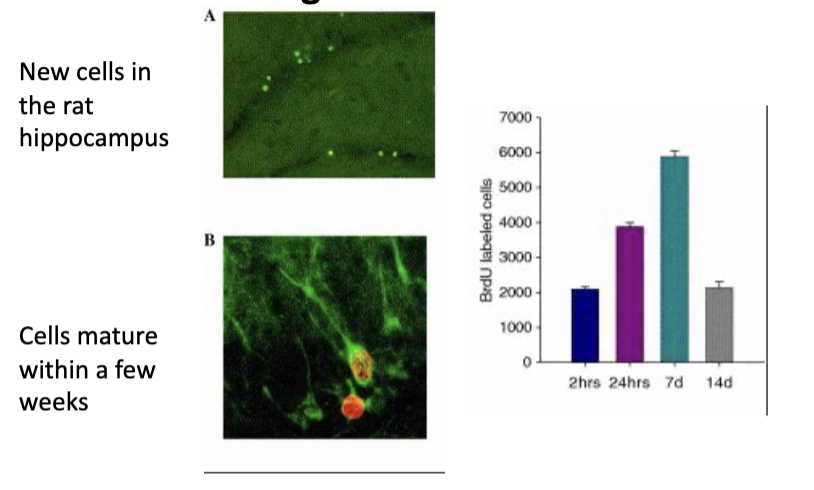
Maturation of newborn cells
1-6% cell turnover per month
Neurogenesis is decreased by stress, depression, and normal aging
Neurogenesis is increased by excercise, antidepressants like Prozac, ETC, and Estrogen
effects of stress and antidepressants on neurogenesis in DG
stress decreases # of baby neurons, antidepressant increase # of baby neurons
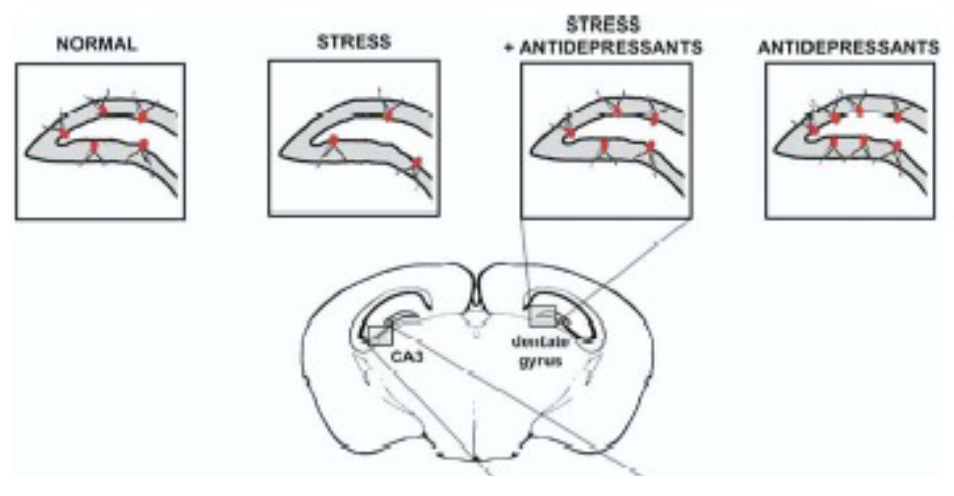
effects of chronic stress on neurogenesis in DG
chronic stress reduces DG neurogenesis, but these deficits appear to recover
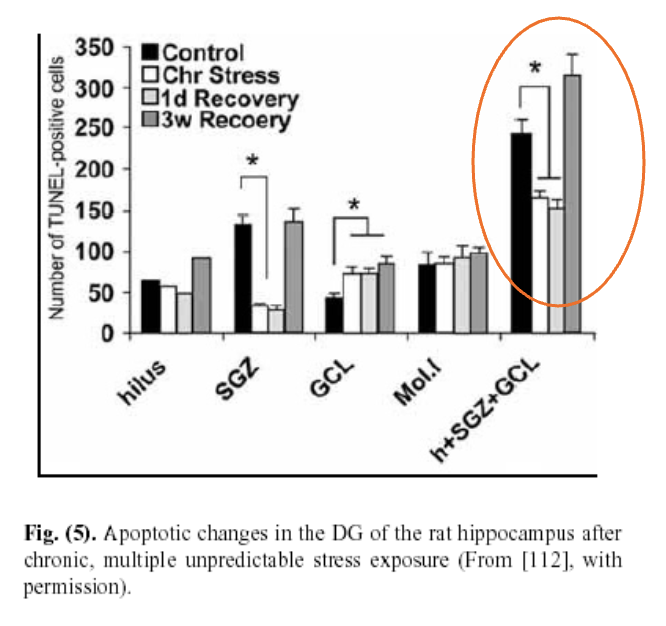
effects of hippocampal dependent learning
Neurogenesis is increased by extensive hippocampal dependent learning (i.i., trace, but not decay conditioning)
study: trace decay needs hippo, delay conditioning does not
found: 30 days after learning, there were more surviving cells in hippo if you did a task that involves hippo (trace conditioning)
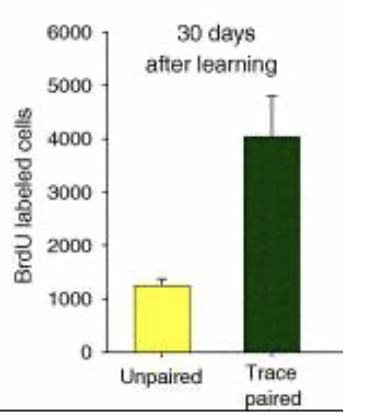
When does neurogenesis occur in humans?
autopsy hippocami - thousands of immature neurons in the DG, throughout the lifespan
autopsy hippocampi (ages prior to birth to 77) - new cells only observed in first year of life
→ still controversial, reduced in aging and so far only indirectly linked to memory
neurogenesis summary
New cells are generated in the DG of the hippocampus (probably in humans? ideally suited to support episodic memory)
Neurogenesis is related to memory (e.g., stress, depression, aging, exercise, antidepressants etc)
? can injection of stem cells or molecular therapists (neurotropic factors) reverse memory declines?
Brain Stimulation - clinical reports during surgery
reviewing showing electrical stimulation leading to reminiscences (e.g., hearing an old song, seeing a place from the past, recalling an event)
hippocampus/anygdala stim. produced episodic memories
perirhinal and entorhinal cortex stim. produced reports of familiar objects, semantic memories & dreams
lateral temporal lobe (auditory semantics) and inferior temporal lobe (visual semantic)
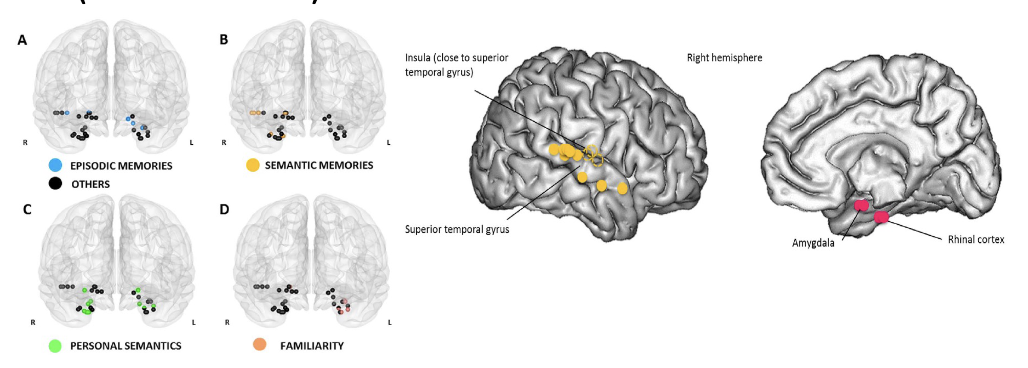
Can Brain Stimulation Improve Memory
Methods:
Deep Brain Stimulation (DBS) - electrodes implanted for clinical purposes in the brain or on the cortical surface
Transcranial Magnetic Stimulation (TMS) - high intensity magnetic fields on scalp used to induce electrical currents in cortex
Transcranial Direct Current Stimulation (tDCS) - electrical currents applied directly to the scalp
Stimulation may impact memory immediately by altering firing rates, or by altering neural plasticity
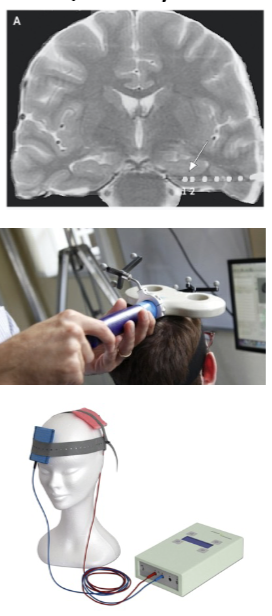
Deep Brain Stimulation (DBS) during encoding and retrieval
Encoding
entorhinal and hippocampal stimulation impaired spatial navigation and verbal memory encoding
parahippo, cingulate and frontal cortex stimulation had no effect
Retrieval
hippocampal stimulation disrupt recognition retrieval for objects, words & faces (lateralized effect)
→ DBS of MTL disrupts encoding and retrieval
Deep Brain Stimulation (DBS) of various locations
Stimulation of various locations in 22 patients during word encoding
stimulation of lateral temporal cortex increased recall
stimulation of other regions (i.e., hippo, parahippo, prefrontal) led to small reductions in recall
Same paradigm, but identified a pattern of successful encoding activity (i.e., more high than low frequency oscillations), then stimulated (.5s) when this signal decreased
lateral temporal cortex stimulations led to better recall
→ DBS of lateral temporal cortex may enhance encoding?
(does it impact memory processing per se, or semantic processing, vigilance , or attention?)
DBS stimulation of various locations during word encoding
stimulation of lateral temporal cortex increased recall
stimulation of other regions (i.e., hippo, parahippo, prefrontal) led to small reductions in recall
identified a pattern of successful encoding activity (i.e., more high than low frequency oscillations), then stimulated (.5s) when this signal decreased - lateral temporal cortex stimulation led to better recall
→ DBS of lateral temporal cortex may enhance encoding? (does it impact memory processing per se, or semantic processing, vigilance, or attention?)
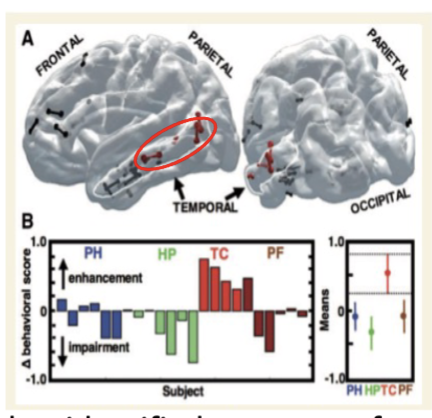
Continuous fornix stimulation (vs sham) for 12 months in patients with mild AD
Increased metabolism at 6 months
no effect on cognitive measures of AD (but trend to impair if <65 years and improve if >65??)
→ Chronic DBS of the fornix may slow progression of AD in some patients, but increase progression in others?
Transcranial Magnetic Stimulation (TMS) (neural)
TMS (high and low frequency, over frontal/temporal/parietal regions, pre-encoding/post-encoding) sometimes improves and sometimes reduces memory
→ TMS may impact explicit memory, but its effects are complex
(Note: TSM of visual cortex may impact visual WM)
Transcranial Magnetic Stimulation (TMS) (positive)
over left parietal lobe (connected to hippo)
increased cued recall for new face-word pairs
of the precuneus (medial parietal) in AD patients)
enhanced visual LTM
→ Chronic TMS stimulation of parietal cortex can improve memory (memory, semantic processing, attention?)
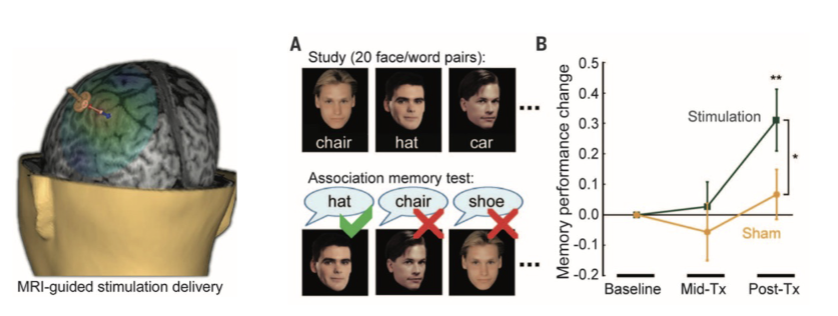
tDCS
meta-analysis of 20 long term verbal memory DCS studies. “Left ventrolateral prefrontal and temporo-parietal sites appeared most likely to enhance episodic memory, although any significant effects were based on findings from single studies only.”
meta-analysis of 38 long term memory tDCS studies - “together, the effects of tDCS were small and non-significant.” The effects were slightly larder for recall than recognition, and the largest over left parietal sites.
→ so far, tDCS does not appear to be very effective
Summary of the three types of brain stimulation
DBS of MTL impairs memory, but lateral temporal may help
Repeated TMS of parietal cortex may improve memory
tDCS does not appear to do much
Sci-fi: brain stimulators for AD patients?